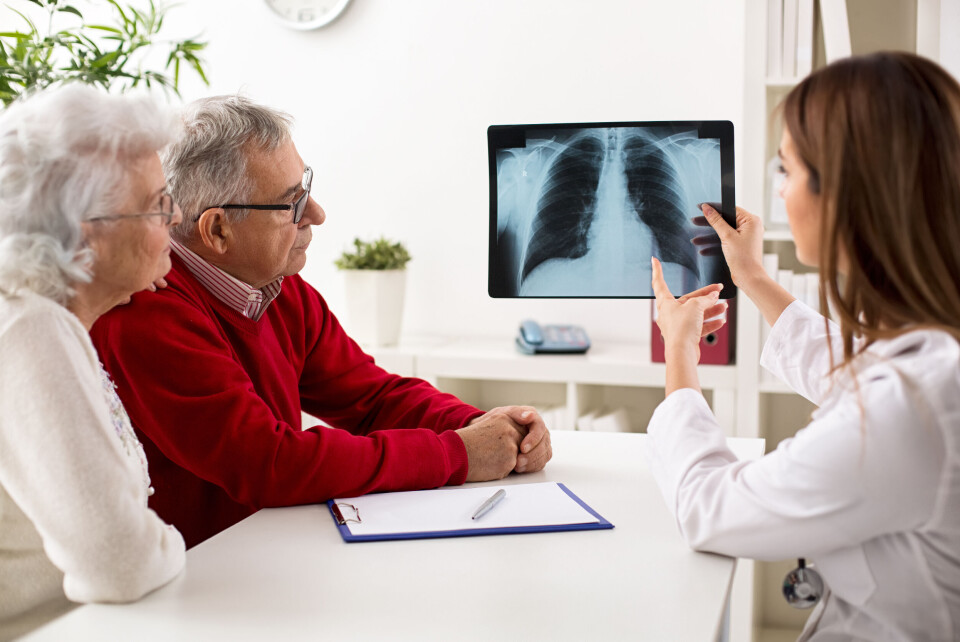-
Britons are the largest foreign community of second-home owners in Nouvelle Aquitaine
See which other departments in the region are popular with British nationals
-
Travellers risk extra costs under new Eurotunnel ticket rule
Some fare options are less flexible and less forgiving of lateness
-
May will be difficult month for train travel in France, warns minister
Two major train unions are threatening to strike and are ‘not willing to negotiate’, he says
France looks to offer routine lung cancer screening to at-risk groups
Health authorities have welcomed the idea of a pilot scheme with one lung specialist calling it an ‘historic’ health decision. The cancer kills 33,000 people per year in France

France could soon offer routine screening for lung cancer after health authorities said such a plan would be “welcome”.
A leading lung specialist called the decision “historic” saying it could catch cancer early and save lives.
La Haute autorité de santé (HAS) yesterday (Tuesday, February 1) said it would “welcome…the launch, from now, of a pilot programme” for lung cancer screening, especially for smokers and others at high risk of the cancer.
Lung experts in France have long been calling for routine screening for people who smoke. Similar schemes are already in place in the US and some other countries.
Lung cancer is the deadliest in France, killing around 33,000 people per year.
Professor Sébastien Couraud, head of pulmonology at the CHU hospital in Lyon, told FranceInfo: “This really is an historic day…This will have a real impact on people’s lives.”
The HAS said that studies suggest that screening of “people who have a high risk of this cancer [such as smokers] reduces its mortality”. Screening can catch cancer early, meaning treatment can begin sooner, giving patients a higher chance of surviving it.
So far, France has always stopped short of rolling out routine screening out of fears that it could lead to “overdiagnosis” - the spotting of tumours that will not become cancerous, but that could still cause the patient to undergo onerous treatment.
Professor Couraud said that “this authorisation will enable us to see if we can reproduce the results of clinical trials in France, and if we can get comparable results that will allow us to roll out more general screening”.
‘Evidence that screening is helpful’
When asked about France’s apparent reticence to introduce such a programme, despite similar ones having been in place in the US for almost 10 years, Professor Couraud emphasised the importance of studies and evidence.
He said: “Above all, there is also the need to accumulate evidence and proof. New studies have come out in the last 10 years, which have confirmed the American results, which show that screening is useful, that screening is feasible.
“In particular, a trial was conducted in Europe, in Belgium and the Netherlands, which showed that it was really effective in reducing lung cancer mortality.”
Professor Couraud said that early detection of lung cancer was crucial.
He said: “The problem with lung cancer is that for a long time, the disease develops without any symptoms. It’s really insidious. You won’t see any symptoms until the illness is relatively advanced, and therefore more difficult to treat.
“We have a better chance of treating it earlier in the illness. And it’s these early forms that we are looking to screen for, because they are asymptomatic.”
Read more:'Identifying those at risk of cancer before they fall ill is key aim'
Professor Couraud agreed that, as with all screening programmes, there would be a risk of overdiagnosis in some cases, but that there was less risk of this when it comes to lung cancer.
He said that on balance, it was better to screen than not, because “all lung cancer can develop rapidly”.
10-year cancer plan
It comes just over six months after France announced a 10-year plan to cut the number of avoidable cancers by 60,000 per year by 2040.
Read more: France's 10-year plan aims to cut high number of avoidable cancers
Tobacco is the main cause of avoidable cancers, with alcohol second, followed by poor diet and lack of exercise.
President Emmanuel Macron has said he hopes that people who will be age 30 in 2030 will be the first generation without tobacco in modern history.
Putting up the cost of cigarette packs further is one planned solution. The government is considering using countries such as the UK or Australia as a model to follow. These countries have the world’s highest prices for cigarettes (one pack costs the equivalent of more than €20 in Australia).
Zero smoking is the eventual aim, Mr Macron has said.
Recent studies have shown that there has been a rise in the “five year after diagnosis” survival rate for nearly all cancers in France. The Institut National de Cancer and national health agency Santé publique France looked at 73 types of cancer from 1989 to 2018.
Survival rates for breast cancer improved by nine percentage points, colon by 12 and lung by 11. However, survival rates vary widely – from 96% for thyroid cancer to one type of lung cancer at just 7%.
Related articles
Cancer in France: 75% of patients affected by medicine shortages
Breast cancer treatment Trodelvy is now available in France
Breast cancer in France: New treatment authorised for use
























